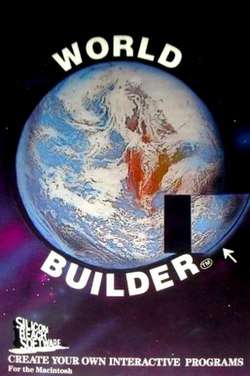World Builder
World Builder is a game creation system for point-and-click adventure games.[1] It was released in 1986 by Silicon Beach Software and had already been used for creating Enchanted Scepters in 1984. In 1994, World Builder along with Course Builder, SuperCard, and HyperDA was cited as the reason Appleton was "something of a legend".[2] On August 7, 1995 developer William C. Appleton released World Builder as freeware.
 | |
| Developer(s) | Silicon Beach Software |
|---|---|
| Initial release | 1986 |
| Stable release | 1.2
/ 1995 |
| Operating system | System 3 |
| Type | Game Creation System |
| License | Freeware |
Functionality
The games World Builder created used different layers of code to manipulate the images the game contained: object code, scene code, and finally world code.[3] The World Template included with the program contained default world code with default failure responses to standard text commands like north, south, up, down, and so on. Other than actions with characters (which were always combat oriented) and clicking on objects to pick them up everything had to set up through code and dialog boxes.
The map is organized in compass directions and up/down as was common in earlier interactive fiction. Characters can be defined to move around independently and interacted with. There is also a special provision for weapons, which have a stochastic impact just as the dice of role-playing games. The game system includes QuickDraw vector graphics, a scripting language and digitized sound. A large number of games were made and released in circulation, many after the application was made freeware in 1995. The software does not support 32 bit addressing and hence games created with it are not compatible with System 7 or later. A ResEdit hack was provided to allow the program (and its games) to run on System 7 to 9 but sounds would not play on Power PC Macs.
Ray Dunakin, author of numerous titles using the game development system, contributed various documentation and supporting files for the World Builder 1.2 release.
Reception
The program was reviewed in 1987 in Dragon #118 by Hartley and Patricia Lesser in "The Role of Computers" column. The reviewers stated that "The variety of worlds, scenes, and characters you can create and motivate seems endless... We are really impressed with World Builder."[4] In a subsequent column, the reviewers gave the program 3½ out of 5 stars.[5]
Games
- Another Fine Mess
- A Mess O' Trouble
- Bug Hunt
- Enchanted Scepters
- Little Pythagoras
- Lost Crystal
- Midnight Snack
- Mountain Of Mayhem
- Psychotic!
- Quest for T-Rex
- Radical Castle
- Ray's Maze
- Star Trek Game
- Wishing Well
References
- Robinson, Ronda (November 20, 2006). "On-demand software company replaces Appleton's fun 'n' games". Knox Business Journal. Archived from the original on August 12, 2007. Retrieved 2008-11-04.
- Kantrowitz, Barbara; Ramo, Joshua Cooper (Aug 28, 1994). "Garage-Band Programmers". Newsweek. Retrieved 2017-09-12.
- World Builder. Silicon Beach Software. 1986. pp. 83–85.
- Lesser, Hartley; Lesser, Patricia (February 1987). "The Role of Computers". Dragon (118): 92–98.
- Lesser, Hartley; Lesser, Patricia (October 1987). "The Role of Computers". Dragon (126): 82–88.